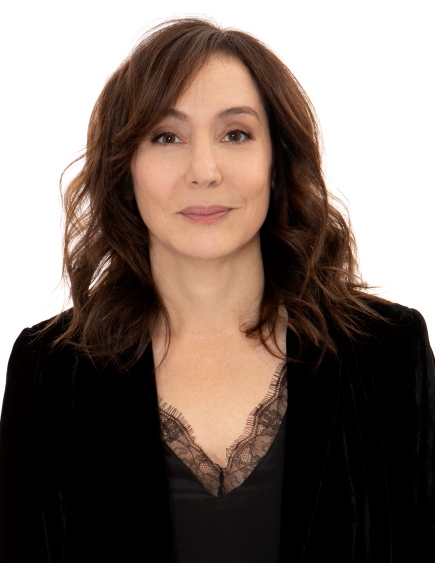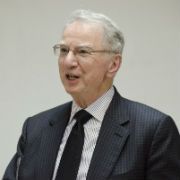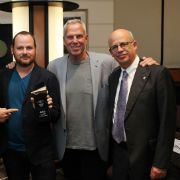Finding Humor in Imperfection
"Holocaust jokes are a wonderful thing,” says TAU alumna Einav Galili. “When you laugh at something, it doesn’t dishonor it; it’s another way of dealing with something that’s impossible to deal with…the Holocaust intrigues me and in that way it is totally mine to laugh about.”
By contrast, if a German told a Holocaust joke, “I would shoot him,” she says jokingly, maintaining her trademark poker face.
“Comedy is a way to expose our dark side without anyone dying.”
For decades, Galili has brought a sharp, intellectual and hilariously wry voice to Israeli media. Yet, with her influence comes responsibility: Galili believes that she has a role to play in shaping public discourse. “It’s part of my job to extract topics from their conventional molds and clichés and forge something more complex,” she says.
In Israel, “you must be radical to have a presence…People want short, extreme and click-baity. I often try to give a fuller picture….I try very hard not to be predictable.”
The same is true about the range of subjects she broaches on the morning radio show she co-hosts: from politics to the connection between Koala and human diseases. For Galili, comedic and serious content need not be separated. “The most interesting people are those whose humor is laced with pain and whose pain is laced with humor. In the end, it’s all different layers of the same thing.”
Yet, sometimes being funny comes at a cost.
As a main panelist on one of the country’s longest-running TV satires, State of the Nation (later renamed Back of the Nation), Galili is no stranger to controversy.
“What we say makes people uncomfortable…..It’s a program that’s a big headache to support and maintain. You have to withstand pressure and you receive angry phone calls.”
Still, she has never been censored. With governments around the world cracking down on journalists and limiting freedom of speech, she doesn’t take that for granted and considers herself “spoiled” in this respect. At the same time, she says that viewers themselves often quash serious programming.
“You come home in the evening. Life is tough…it’s hard to make a living…there are a million things to deal with. You don’t have the energy for another burdensome investigation about violence against women. You want Netflix!” she says. “I can understand them.”
Exposing national neuroses
That being said, satire is “like the vital signs of a human body. If we don’t have it, it’s like declaring death.”
Humor is especially important during crises such as the Corona pandemic. “Sometimes humor can be divisive; one groups laughs at another. But when people laugh about a common experience such as Corona, it brings people together.”
She adds, "Humor exposes the neuroses that characterize Israeli society….there is a very interesting dance with humor around taboos. It helps determine what’s legitimate and what’s not.”

In addition to her radio show and Back of the Nation, she hosts the Israeli version of the BBC TV program Room 101, in which she interviews Israeli personalities about their biggest fears or pet peeves. She also lectures about humor and writes newspaper columns. She recently produced a documentary about the anti-aging industry.
Galili is one of several well-known female comedians in Israel, but women are still the minority in the field. An avowed feminist, she says that she insists on having at least one female writer on the Back of the Nation team. What separates her from her male counterparts, she says, are the jokes she doesn’t make. She will never make a joke about a woman being old or ugly or fat, she says. ”It’s not in my agenda.”
She will, however, soliloquize about her children's hamsters, riffing on their proclivity for reproduction and what happened when she had to eulogize one of two identical pets (she didn't know which one died.) Photo: Adi Orni
Her various endeavors have given her insights into the human psyche. ”We live in a society preoccupied with perfection: We strive to look perfect, to make a good impression, to portray ourselves as more than what we are, more beautiful, younger, more confident, more successful in our careers, taller, skinnier.”
To her, perfect is boring. It is exactly in imperfection—“the defects and the cracks”—that she finds her most engaging and inclusive material.
Drawing on academic training
Analyses like these exemplify how psychology permeates Galili’s many professional roles. Her TAU studies left an imprint on her in other ways too. Studying at the University taught her discipline and the value of hard work. In academia, and particularly in psychology, a very competitive program, everything is systematic, she says. If you put in the effort, you see results.
Her studies also armed her with critical thinking skills—how to differentiate between reliable and unreliable information—an important ability in the era of social media and fake news.
Galili recalls her time at TAU as a very enjoyable and enriching experience. She was completely immersed in her studies, alongside “amazing” classmates and inspiring professors. She remembers Prof. Ina Weiner, a “fascinating” professor who taught her honors psychology, and art historian Dr. Henry Unger, who “taught me elementary terms about the arts world. It was precisely enough to know what to look for.”
As an alumna, Galili is one of 85,000 members of the TAU Alumni Organization, which is celebrating its fifth anniversary this year, under the direction of Sigalit Ben Hayoun. The Organization’s goal is to leverage the influence of TAU alumni as a positive force in Israeli society and serve alumni through shared knowledge, networking and opportunities.
Upon receiving her BA, Galili completed the coursework for a master’s degree in psychology, but never submitted a thesis.
Even though she is very happy with where her career has taken her, she has never stopped dreaming of returning to TAU to complete her MA.
We hope she realizes that dream.
-By Melanie Takefman






